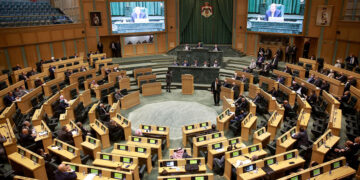Sarah Leah Whitson is the Executive Director of DAWN.
Published in Foreign Policy, September 19, 2024
The United States tends to hail the ICC when it prosecutes American enemies but assails the court when it goes after U.S. allies.
The United States' U.N. Ambassador Linda Thomas-Greenfield struck an aggressive blow against the rules-based international order at a Council on Foreign Relations talk last week. In response to my question about whether the U.S. government would comply with the orders of the International Court of Justice (ICJ) to cease assistance to Israel for its illegal occupation and expected International Criminal Court (ICC) arrest warrants for Israeli Prime Minister Benjamin Netanyahu and Defense Minister Yoav Gallant—both of whom have been indicted by the ICC—the U.N. ambassador was definitive: The U.S. government would not comply with any warrant because it has a "problem with the court's ruling."
"Let me be clear," she said. "We would not arrest [Netanyahu]."
While the United States is not a member of the ICC and is therefore not obligated to comply with the court's arrest warrants, Washington has cooperated when the ICC has targeted U.S. adversaries. Indeed, when the ICC issued arrest warrants against officials of other non-ICC member states, like Russian President Vladimir Putin and former Sudanese President Omar al-Bashir, the U.S. government celebrated those decisions and urged cooperation with the court. Indeed, U.S. President Joe Biden "welcomed" the ICC's arrest warrant for Putin for war crimes in Ukraine and ordered the U.S. government to start sharing information about possible Russian war crimes with the court.
Congress went so far as to revoke provisions in U.S. laws that prohibited cooperating with an ICC investigation at least insofar as they pertain to Ukraine, and issued a resolution commending the prosecutor for securing the warrant. Republican U.S. Sen. Lindsey Graham chimed in, saying that "this arrest warrant is extremely significant because it's an action of an international evidence-based body that will stand the test of history."
Graham took a markedly different tone when the court indicted Israeli officials however, calling them "outrageous actions by the ICC against the State of Israel and I will feverishly work with colleagues on both sides of the aisle in both chambers to levy damning sanctions against the ICC…" He attacked the very same prosecutor who had indicted Putin as "drunk with self-importance."
This is not the first instance of states refusing to cooperate with the ICC. Even some member states have failed to execute arrest warrants the court has issued, like Mongolia's refusal to arrest Putin earlier this month when he visited, or Jordan's and South Africa's failure to arrest Bashir.
Thomas-Greenfield's declaration means that the United States, the supposed enforcer of the international rules-based order, is now keeping company with states that ignore the court's orders. This sort of rhetoric from leading U.S. officials further erodes the standing of all international courts and will be used as a justification by authoritarian governments who will copy the U.S. playbook to reject international law and ignore those seeking to enforce it.
The Biden administration has made no secret of its disdain for the International Criminal Court's decision to prosecute Israeli officials and members of Palestinian armed groups for war crimes, crimes against humanity, and other violations of the Rome Statute since 2014, following the State of Palestine's 2018 referral.
On June 4, the U.S. House of Representatives once again passed a bill to sanction the prosecutor, and twelve U.S. senators responded to the prosecutor's request for warrants by threatening, "Target Israel and we will target you. If you move forward … we will move to end all American support for the ICC, sanction your employees and associates, and bar you and your families from the United States. You have been warned."
While both Secretary of State Antony Blinken and President Joe Biden complained that the ICC had "equated" Hamas and Israel, presumably because he requested arrest warrants for both Israeli and Hamas officials, Thomas-Greenfield's comments are the first time that a senior U.S. official has baldly declared that Washington will defy an ICC arrest warrant.
To justify this stance, Thomas-Greenfield explained that the U.S. "has questions" about the court's exercise of jurisdiction over Israel, presumably referring to the Biden administration's rejection of the court's jurisdiction over Israeli nationals. (She also incorrectly asserted that the U.S. had already reflected its unwillingness to arrest Netanyahu when he visited Washington in July, suggesting that the court had issued the arrest warrants, although it has not).
The question of territorial jurisdiction, however, is a matter that the court ruled on in 2021, refusing Israel's arguments challenging jurisdiction, recognizing Palestine as a member state of the court with legal capacity to refer a case in its territory to the court, and reiterating the court's authority to exercise jurisdiction over non-member state nationals who commit crimes in such a territory.
The fact that Netanyahu is the head of government in Israel does not immunize him from international criminal prosecution. The ICC has previously held that such domestic immunities do not trump an ICC arrest warrant because they would undermine the ICC's purpose, including Article 27 of the Rome Statute, which provides that "all people are subject to the statute without distinction based on official capacity."
The court furthermore clarified that complying with an arrest warrant does not mean subjecting a head of state to domestic prosecution—something that domestic immunity statutes prohibit —but merely transferring them to the The Hague for international criminal prosecution.
More significantly, Thomas-Greenfield's suggestion that compliance with a court's rulings is optional depending on whether or not a government agrees with a ruling further undermines the very basis of the ICC's capacity to act as an international court with the power to issue binding decisions. Basically, Washington's message to the world is that it loves the ICC when it prosecutes America's enemies and hates the court when it prosecutes its friends.
While the Biden administration in 2021 canceled U.S. sanctions against the previous ICC prosecutor, Fatou Bensouda, her staff, and their families that the Trump administration imposed on them for pursuing the prosecution of Israelis and Americans, it has not stopped pressuring the new Prosecutor, Karim Khan, to back off; Khan said that "some elected leaders" even told him, that the ICC "was built for Africa" and for "thugs like Putin" but not Western or Western-backed leaders.
Israeli officials have continued their nine-year campaign to spy on, harass, pressure, smear and threaten both the current and former prosecutors in an attempt to derail the investigation. It is exactly such attacks on the court in the face of the first prosecution of a U.S. ally that have led a number of African states to threaten to withdraw from the court, seeing it as mere cudgel with which to beat African abusers, while never allowing it to move against U.S. allies.
A related question Thomas-Greenfield refused to answer was whether the United States would comply with the orders issued by the International Court of Justice, which hears disputes between states. In a recent advisory opinion ruling, the ICJ ruled that Israel's occupation of Palestinian territories is illegal and that it must remove its forces and settlers from there and reverse its illegal annexations.
The court ordered states not to recognize any illegal Israeli acts, such as annexations (The Trump administration recognized Israel's annexations of East Jerusalem and the Golan Heights, but the Biden administration has not reversed these.) More significantly, the court said that states are under obligation "not to render aid or assistance in maintaining the situation created by Israel's illegal presence in the Occupied Palestinian Territory."
This is a problem for the U.S government, if it is to obey the directives of a court of which it is a founding member, by virtue of Washington's ratification of the United Nations Charter. That's because the United States is Israel's largest aid provider, with over $20 billion in military aid provided in 2024, and more than that in arms sales authorizations.
As a result, such aid not only violates U.S. laws prohibiting arms to states that violate human rights, but a direct order from the ICJ. The U.S. Mission to the United Nation's tweet this week stating that it will vote against a pending U.N. General Assembly resolution to enforce the advisory opinion is a pretty clear indication that the U.S. has no intention of complying with the ICJ.
The continued transfer of U.S. weapons to Israel may well become the source of charges against the U.S. government in the ICJ occupation case (as well as the separate case South Africa initiated concerning genocide claims against Israel), but also against individual U.S. officials in the ICC case, for aiding and abetting the crimes with which Israel is charged.
During her talk, Thomas-Greenfield made a point of remembering her "friend and mentor" Madeleine Albright. I suspect Thomas-Greenfield's remarks last week may go down as her very own Albright moment.
In 1996, then-Secretary of State Albright infamously responded to 60 Minutes host Lesley Stahl's question about whether the "price" of U.S. sanctions in Iraq, which had caused "half a million dead Iraqi children… more children than died in Hiroshima" was "worth it," by saying "I think it's a very hard choice, but the price—we think the price is worth it."
It's sad and somewhat ironic to have solicited an equally damning response from Thomas-Greenfield, highlighting, 30 years later, the persistence of the United States' highly selective use of international law as a political cudgel against opponents, but never against itself or U.S. allies.
The downside of this approach, of course, is that international law—and the courts responsible for upholding it—cannot survive the world's leading superpower's continued assaults, and will continue to crumble, to the detriment of all those international legal institutions are meant to serve, Americans included.





































